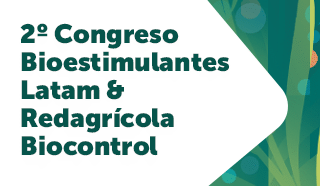28/Apr/2022
#05
SUBSCRIBE TO OUR NEWSLETTER
Suscríbete a nuestro newsletter
Last issue articles
- Biome: the space gaining protagonism in biological strategies for crops
- The export dynamics driving the Mexican biologicals market
- New model developed to evaluate effects of two or more biostimulants combined in a single crop
- Dr. Wagner Bettiol and the biocontrol market in Brazil
- Las propiedades que hacen del Trichoderma un socio clave en la búsqueda de mejores desempeños en los cultivos
- Changes in the new regulation on fertilizers and biostimulants in Chile
- Innovak Global, the expansion of root specialists
Market movers
- Renewable-based nitrogen fertilizer firm raises US$ 20 million in investment round
- Bayer and Ginkgo Bioworks close agreement to strengthen open innovation platform for agricultural biologics
- Argentinean firm Puna Bio: Millions raised to study superbacteria for agricultural use
- Corteva Agriscience signed an agreement to acquire leading biologics company Symborg
- Brazilian study uncovers ants' potential in crop protection
- Huber acquires specialty plant nutrition producer Biolchim
- UPL announces agreement to distribute bioprotector based on orange oil
- ICL and Lavie Bio start strategic collaboration to develop new biostimulants
- Hortitool and Green Smile to organize the Morocco Berry Conference 2022
Latin America drives ADAMA's revenues in 2021
The results of bioinput companies continue to show the dynamism of the Latin American market. This is the case of ADAMA, the Israeli company that is now part of the Syngenta Group. The company recently reported results for 2021, registering a 17% increase in its global quarterly and annual sales.
Revenues for the full year reached US$4,813 million, compared with US$4,128 million the previous year. This was due to a 12% increase in sales volume and a 4% increase in average price. Earnings before interest, taxes, depreciation and amortization (Ebitda) reached US$ 671 million, an increase of 7% for the year.
The effect of its growth in the region, where it generates its largest volume of business, was clear. In 2021, ADAMA recorded revenues of US$ 1.276 billion in Latin America. This exceeds the US$ 1,072 million in Europe and US$ 917 million in the United States.
Latin America not only has more volume, but also higher growth for the company. Considering fixed exchange rates, the region had an increase of 25.8% in the first line of the fourth quarter and 19.3% for the full year. This outperformed North America, which grew 11.1% in the quarter and 17.4% for the year. Europe, on the other hand, was far behind, expanding by 3.4% in the quarter and 3% for the year.
The company explains that growth in Latin America was driven by Brazil as well as in the rest of the markets. It notes that in Brazil, the company benefited from the good soybean planting season, as well as strong demand from farmers, which favored higher prices. The company began local production and marketing in Brazil of ARMERO™, its new dual-mode fungicide containing the active ingredients Prothioconazole and Mancozeb, benefiting from its new in-house production of Prothioconazole, a leading broad-spectrum systemic fungicide. The company also achieved satisfactory growth in Paraguay following an acquisition in the country in the fourth quarter of 2020, as well as in Central America and many other countries in the region.
Nevertheless, growth in the region was lower than in other developing areas. In Asia Pacific, sales rose 36.4% in the quarter and 28.5% for the full year (US$898 million). In India, Middle East and Africa, revenues rose 20.7% in the quarter and 12.7% for the year (US$ 50 million).
El español Ignacio Domínguez, Presidente y Director General de ADAMA, dice que si bien en 2021 alcanzó un extraordinario crecimiento excepcional, “ha sido un año muy difícil con muchos retos, como el aumento masivo de los costes de las materias primas y los productos intermedios, así como el aumento significativo de los costes de transporte y logística y la escasez de contenedores”.
These challenges were offset by sales growth and, especially during the fourth quarter, a price increase that allowed the company to face the higher costs.
ADAMA is present mainly in the agricultural control segments, although it has also developed lines in plant nutrition. Although its origin is based on chemical products, the company has been gaining space in the biological segments.
Last issue articles
- Biome: the space gaining protagonism in biological strategies for crops
- The export dynamics driving the Mexican biologicals market
- New model developed to evaluate effects of two or more biostimulants combined in a single crop
- Dr. Wagner Bettiol and the biocontrol market in Brazil
- Las propiedades que hacen del Trichoderma un socio clave en la búsqueda de mejores desempeños en los cultivos
- Changes in the new regulation on fertilizers and biostimulants in Chile
- nnovak Global, la expansión de los especialistas en la raíz
Market movers
- Argentinean firm Puna Bio: Millions raised to study superbacteria for agricultural use
- Corteva Agriscience signed an agreement to acquire leading biologics company Symborg
- Brazilian study uncovers ants' potential in crop protection
- Huber acquires specialty plant nutrition producer Biolchim
- UPL announces agreement to distribute bioprotector based on orange oil
- ICL and Lavie Bio start strategic collaboration to develop new biostimulants
- Hortitool and Green Smile to organize the Morocco Berry Conference 2022
About us
Biologicals Latam es una revista digital de Redagrícola que informa de manera especializada sobre la intensa actividad que se está desarrollando en el espacio de los bioinsumos para la producción agrícola. Esta publicación es complemento del Curso Online de Bioestimulantes y Biocontrol y las conferencias que este grupo de medios realiza en torno al tema.



